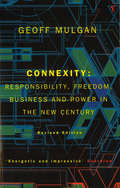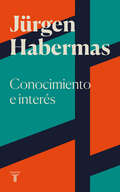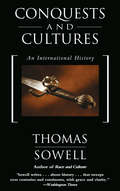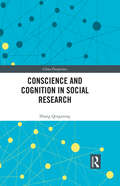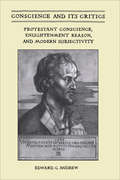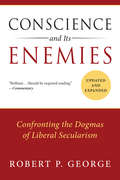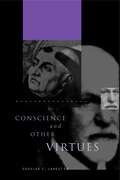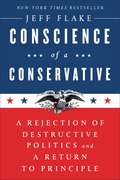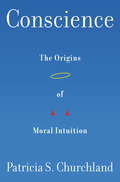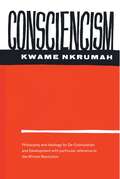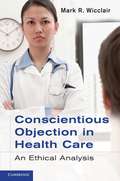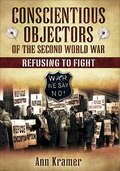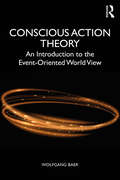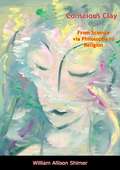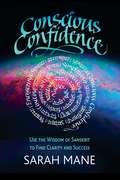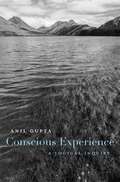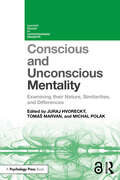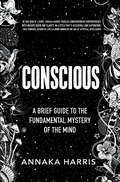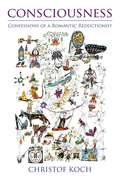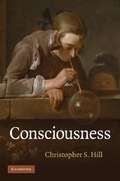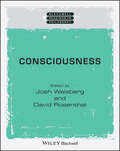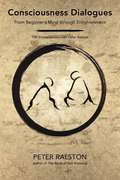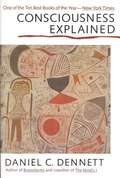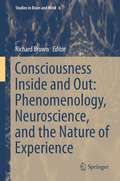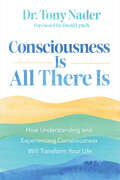- Table View
- List View
Connexity: How to Live in a Connected World
by Geoff MulganCONNEXITY is the philosophical counterpart to Will Hutton's essentially political book. It looks at the profound tension that exists between two recent achievements of humanity: greater freedom (over how to live, who to love, what to believe and say, where to trade), and greater interdependence, or 'connexity' (through the financial markets, military structures, the internet, the ecosystem). This tension has led to crisis: institutions, including governments, sense themselves to be inadequate; individuals are faced with a mass of conflicting information and values. The issue we face, which will ultimately determine human survival in our densely packed planet, is how the tension between these two can be resolved, and a new order established. Mulgan presents his own powerful solution to this crisis. It is based around the notion of 'connexity': breaking down our rigid sense of ourselves as isolated units and seeing our lives as part of a system, a positive network of co-responsibility.
Conocimiento e interés
by Jurgen HabermasLa obra clave para entender el pensamiento de Habermas, pensador emblemático de la Escuela de Frankfurt.Este es probablemente el libro más célebre del filósofo alemán Jürgen Habermas y la obra que catapultó su carrera. Publicado en 1968-en el contexto de la disputa sobre el positivismo-, examina las corrientes más importantes del pensamiento moderno: kantismo yhegelianismo,pragmatismo anglosajón y tradición hermenéutica alemana, marxismo y psicoanálisis. Mediante el análisis de estas corrientesde pensamiento,Habermas analiza los procesos de investigación que determinan el significado y la validez de nuestras afirmaciones científicas.Únicamente una teoría social permite una crítica radical del conocimiento, esa es la tesis esencial de Habermas. Con esta premisa, nosolo intervieneen la discusión positivista orientada a cuestiones de método, sino también en la discusión política orientada a la práctica.
Conquests and Cultures: An International History
by Thomas SowellThis book is the culmination of 15 years of research and travels that have taken the author completely around the world twice, as well as on other travels in the Mediterranean, the Baltic, and around the Pacific rim. Its purpose has been to try to understand the role of cultural differences within nations and between nations, today and over centuries of history, in shaping the economic and social fates of peoples and of whole civilizations. Focusing on four major cultural areas(that of the British, the Africans (including the African diaspora), the Slavs of Eastern Europe, and the indigenous peoples of the Western Hemisphere -- Conquests and Cultures reveals patterns that encompass not only these peoples but others and help explain the role of cultural evolution in economic, social, and political development.
Conscience and Cognition in Social Research (China Perspectives)
by Zhang QingxiongThis book is a critical examination of the different roles of conscience and cognition in social research in China and the West, exploring how the two traditions can enrich each other and help societies navigate through the complex intellectual and moral crises of our time.Drawing on a rich array of primary and secondary sources, this title traces the development of the Confucian conception of conscience, from Confucius and Mencius to Xiong Shili and Mou Zongsan, two representatives of Neo-Confucianism. This primacy of a moral sense is compared and contrasted with the tension within the Western culture between strains that place a premium on understanding and a deep commitment to the search for meaning in such philosophers as Habermas and Heidegger. The author explicates why such a commitment is essential to social research and how the focus on instrumental rationality that has defined modernity may be corrected by recentering the role of conscience on intellectual inquiry in general. To that end, both Chinese and Western cultures have plenty to offer both in terms of substantive insights and research methodologies.The book will be a crucial reference for scholars and students interested in Western philosophy, comparative philosophy and Chinese philosophy.
Conscience and Its Critics: Protestant Conscience, Enlightenment Reason, and Modern Subjectivity
by Edward AndrewConscience and Its Critics is an eloquent and passionate examination of the opposition between Protestant conscience and Enlightenment reason in the seventeenth and eighteenth centuries. Seeking to illuminate what the United Nations Declaration of Rights means in its assertion that reason and conscience are the definitive qualities of human beings, Edward Andrew attempts to give determinate shape to the protean notion of conscience through historical analysis. The argument turns on the liberal Enlightenment's attempt to deconstruct conscience as an innate practical principle. The ontological basis for individualism in the seventeenth century, conscience was replaced in the eighteenth century by public opinion and conformity to social expectations. Focusing on the English tradition of political thought and moral psychology and drawing on a wide range of writers, Andrew reveals a strongly conservative dimension to the Enlightenment in opposing the egalitarian and antinomian strain in Protestant conscience. He then traces the unresolved relationship between reason and conscience through to the modern conception of the liberty of conscience, and shows how conscience served to contest social inequality and the natural laws of capitalist accumulation.
Conscience and Its Enemies: Confronting the Dogmas of Liberal Secularism
by Robert P. George"Many in elite circles yield to the temptation to believe that anyone who disagrees with them is a bigot or a religious fundamentalist. Reason and science, they confidently believe, are on their side. With this book, I aim to expose the emptiness of that belief." From the introduction: Assaults on religious liberty and traditional morality are growing fiercer. Here, at last, is the counterattack. Showcasing the talents that have made him one of America's most acclaimed and influential thinkers, Robert P. George explodes the myth that the secular elite represents the voice of reason. In fact, George shows, it is on the elite side of the cultural divide where the prevailing views frequently are nothing but articles of faith. Conscience and Its Enemies reveals the bankruptcy of these too often smugly held orthodoxies while presenting powerfully reasoned arguments for classical virtues.
Conscience and Other Virtues: From Bonaventure to MacIntyre (G - Reference, Information and Interdisciplinary Subjects)
by Douglas C. LangstonConscience, once a core concept for ethics, has mostly disappeared from modern moral theory. In this book Douglas Langston traces its intellectual history to account for its neglect while arguing for its still vital importance, if correctly understood.In medieval times, Langston shows in Part I, the notions of "conscientia" and "synderesis" from which our contemporary concept of conscience derives were closely connected to Greek ideas about the virtues and practical reason, although in Christianized form. As modified by Luther, Butler, and Kant, however, conscience later came to be regarded as a faculty like will and intellect, and when faculty psychology fell into disrepute, so did the role of conscience in moral philosophy.A view of mature conscience that sees it as relational, with cognitive, emotional, and conative dimensions, can survive the criticisms of conscience as faculty. In Part II, through discussions of Freud, Ryle, and other modern thinkers, Langston proceeds to reconstruct conscience as a viable philosophical concept.Finally, in Part III, this better grounded concept is connected with the modern revival of virtue ethics, and Langston shows how crucial conscience is to a theory of virtue because it is fundamental to the training of any morally good person.
Conscience of a Conservative: A Rejection of Destructive Politics and a Return to Principle
by Jeff Flake<P>In a bold act of conscience, Republican Senator Jeff Flake takes his party to task for embracing nationalism, populism, xenophobia, and the anomalous Trump presidency. The book is an urgent call for a return to bedrock conservative principle and a cry to once again put country before party. <P>Dear Reader, <P> I am a conservative. <P> I believe that there are limits to what government can and should do, that there are some problems that government cannot solve, and that human initiative is best when left unfettered, free from government interference or coercion. I believe that these ideas, tested by time, offer the most freedom and best outcomes in the lives of the most people. <P> But today, the American conservative movement has lost its way. Given the state of our politics, it is no exaggeration to say that this is an urgent matter. <P> The Republican party used to play to a broader audience, one that demanded that we accomplish something. But in this era of dysfunction, our primary accomplishment has been constructing the argument that we’re not to blame. We have decided that it is better to build and maintain a majority by using the levers of power rather than the art of persuasion and the battle of ideas. We’ve decided that putting party over country is okay. There are many on both sides of the aisle who think this a good model on which to build a political career—destroying, not building. And all the while, our country burns, our institutions are undermined, and our values are compromised. We have become so estranged from our principles that we no longer know what principle is. <P> America is not just a collection of transactions. America is also a collection of ideas and values. And these are our values. These are our principles. They are not subject to change, owing to political fashion or cult of personality. I believe that we desperately need to get back to the rigorous, fact-based arguments that made us conservatives in the first place. We need to realize that the stakes are simply too high to remain silent and fall in line. <P> That is why I have written this book and am taking this stand. <P>—Jeff Flake <P><b>A New York Times Bestseller</b>
Conscience: The Origins Of Moral Intuition
by Patricia ChurchlandHow do we determine right from wrong? Conscience illuminates the answer through science and philosophy. In her brilliant work Touching a Nerve, Patricia S. Churchland, the distinguished founder of neurophilosophy, drew from scientific research on the brain to understand its philosophical and ethical implications for identity, consciousness, free will, and memory. In Conscience, she explores how moral systems arise from our physical selves in combination with environmental demands. All social groups have ideals for behavior, even though ethics vary among different cultures and among individuals within each culture. In trying to understand why, Churchland brings together an understanding of the influences of nature and nurture. She looks to evolution to elucidate how, from birth, our brains are configured to form bonds, to cooperate, and to care. She shows how children grow up in society to learn, through repetition and rewards, the norms, values, and behavior that their parents embrace. Conscience delves into scientific studies, particularly the fascinating work on twins, to deepen our understanding of whether people have a predisposition to embrace specific ethical stands. Research on psychopaths illuminates the knowledge about those who abide by no moral system and the explanations science gives for these disturbing individuals. Churchland then turns to philosophy—that of Socrates, Aquinas, and contemporary thinkers like Owen Flanagan—to explore why morality is central to all societies, how it is transmitted through the generations, and why different cultures live by different morals. Her unparalleled ability to join ideas rarely put into dialogue brings light to a subject that speaks to the meaning of being human.
Consciencism: Philosophy and the Ideology for Decolonization
by Kwame NkrumahNkrumah's effort to translate parts of traditional European socialist philosophy into terms relevant to circumstances in Africa at the time.
Conscientious Objection in Health Care
by Mark R. WicclairHistorically associated with military service, conscientious objection has become a significant phenomenon in health care. Mark Wicclair offers a comprehensive ethical analysis of conscientious objection in three representative health care professions: medicine, nursing and pharmacy. He critically examines two extreme positions: the 'incompatibility thesis', that it is contrary to the professional obligations of practitioners to refuse provision of any service within the scope of their professional competence; and 'conscience absolutism', that they should be exempted from performing any action contrary to their conscience. He argues for a compromise approach that accommodates conscience-based refusals within the limits of specified ethical constraints. He also explores conscientious objection by students in each of the three professions, discusses conscience protection legislation and conscience-based refusals by pharmacies and hospitals, and analyzes several cases. His book is a valuable resource for scholars, professionals, trainees, students, and anyone interested in this increasingly important aspect of health care.
Conscientious Objectors of the Second World War: Refusing to Fight
by Ann Kramer&“Drawing on extensive primary sources, Kramer describes the inter-war peace movement that gave birth to many conscientious objectors&” (Military History Monthly). Even today, most histories of the world wars focus on those who fought. Those who refused to do so are often overlooked. It is perhaps only recently that their bravery and extraordinary principles are being recognized. In the First World War, 16,000 men in Britain became the first ever conscientious objectors, and were reviled and brutalized as a result. The conscientious objectors of the Second World War—both men and women—did not experience the same treatment as those earlier COs, but to some extent it was a harder stand to take. It was not easy to refuse to fight in the face of Nazism and Fascism, when large areas of Europe were occupied and when almost the entire British population was organized for total war. Conscientious Objectors of the Second World War: Refusing to Fight tells the stories of these remarkable men and women who bravely took a stand and refused to be conscripted. To bring this fascinating subject to life, Ann Kramer has used extensive prime sources, such as interviews, memoirs, contemporary newspaper accounts, letters, and diaries. Working from these and other sources, she asks who these men and women were who refused conscription and killing, what their reasons were for being conscientious objectors, and how they were treated. The book finishes by exploring their achievements and impact, suggesting that their principles and influence continue to this day. &“[Kramer shows] conscientious objectors in all their infinite variety.&” —Peace News
Conscious Action Theory: An Introduction to the Event-Oriented World View
by Wolfgang BaerConscious Action Theory provides a logical unification between the spirit and the material, by identifying reality as an event that processes personal experiences into explanatory memories, from which personal experiences are regenerated in a never-ending cycle of activity. Baer explores the idea that our personal feelings are undeniable facts that have been systematically excluded from the basic sciences, thereby leaving us with a schizophrenic division between objective materialism and spiritual idealism. Cognitive Action Theory (CAT) achieves this unification by recognizing that the observer’s existence is the foundational premise underlying all scientific inquiry. It develops as an event-oriented physical theory in which the first-person observer is central. By analyzing the methods through which we human observers gain knowledge and create the belief systems within which our experiences are explained, we discover a fundamental truth: all systems are observers and exhibit some form of internal awareness. Events, not the objects appearing in them, are the fundamental building blocks of reality. The book is comprised of three parts: the first addresses the paradigm shift from an object to an event-oriented world view, the second develops the foundations of action physics for an event-oriented world view and the third provides examples of how these new ideas can be applied to move our knowledge up the next evolutionary step of human development. This book will benefit anyone questioning their role in the universe, especially those in interdisciplinary fields of philosophy, psychology, neuroscience and medicine, who seek understanding of quantum theory as the physics of conscious systems that know the world.
Conscious Clay: From Science via Philosophy to Religion
by William Allison ShimerTHE EXCITING “BULL SESSIONS” that so often generate more heat than light, and absorb college students and others in animated arguments far into the night, are nine times out of ten on subjects discussed in these pages. In fact, this book is largely a product of many years of individual and group discussions, as well as of prolonged study in and out of universities of the three essential departments of the modern mind—science, philosophy, and religion.The approach here used is chosen for the scientifically inclined person of today in non-Christian as well as in so-called Christian lands. Jewish and Christian teachers of former periods started by quoting the Bible, but that does not appeal to the skeptical youth of this age. Facts of experience and science must now be the starting point.The arguments employed in these chapters are directed not at the devout religionist but to the troubled and inquiring mind. If this brief but comprehensive analysis of the world, life, ethics, and religion is followed through and its unexpressed implications are thought out and lived out, many will find, I trust, a unifying outlook that will lead not only to happiness, even in tragic misfortune, but to creative living that gives personality survival beyond what we call death. All readers can find interest and profit, I hope, through the adaptation of these ideas to their own experiences, beliefs, and problems, and thus receive some aid in the all-important task of developing their own philosophies of life.”—William Allison Shimer, Preface
Conscious Confidence: Use the Wisdom of Sanskrit to Find Clarity and Success
by Sarah ManeA confidence-boosting program based on the spiritual insights of Sanskrit, the language of enlightenment • Draws on traditional stories from East and West and scholarly works to reveal the wisdom behind Sanskrit words and how to experience them to transform our lives and build confidence, certainty, clarity, and success • Explains the fourfold energy of the Conscious Confidence program: Focusing, Uniting, Simplifying, and Energizing • Offers practical exercises for discovering our inner certainty and overcoming fear, anxiety, and insecurity Called &“the language of enlightenment,&” Sanskrit is truly unique among all the languages of the world. This ancient language, upon which so many of our English words are based, gives us an entire system to show what to do in order to experience the full meaning of a word. In this profound way, Sanskrit offers a touchstone of timeless wisdom that each of us can access to transform our lives and build confidence, certainty, clarity, and success. In Conscious Confidence, Sanskrit scholar Sarah Mane offers a practical confidence-boosting program, derived from the deepest meanings of Sanskrit concepts, to help you establish a safe and secure reference point from which to see the world and make clear decisions on how to act, what to say, and how to feel. She explores the Sanskrit roots of English words related to confidence and success, unlocking rich, three-dimensional understandings of each word as well as guidance on how to obtain confidence and find your path in life. For example, the word attitude, based on its Sanskrit roots, means &“our point of view, our intent, and our conduct.&” A positive attitude means we have a self-aware point of view, have an intent for the good, and conduct ourselves in ways that reflect both. This true attitude gives us a positive and powerful place from which to view the world. The author also incorporates traditional stories from East and West, such as the Mahabharata and the works of Plato, scholarly references, and accounts of people discovering hidden depths in their own lives through the ancient truth of Sanskrit. Drawing upon the deeper meanings behind several Sanskrit words for confidence, Mane outlines principles for harnessing the fourfold energies of Conscious Confidence and offers practical exercises for discovering our inner certainty. She explains how the Conscious Confidence method allows us to tackle the growing anxiety and fear that hang like a shadow over many of us and look to the unchanging core of selfhood for certainty, rather than ever-changing externals. With the Conscious Confidence program and the wisdom of Sanskrit, you can discover a strong and steady inner source of compassion, self-direction, self-empowerment, and the life force of self-confidence.
Conscious Experience: A Logical Inquiry
by Anil GuptaHow, theorists ask, can our private experiences guide us to knowledge of a mind-independent reality? Exploring topics in logic, philosophy of mind, and epistemology, Anil Gupta proposes a new answer to this age-old question, explaining how conscious experience contributes to the rationality and content of empirical beliefs.
Conscious and Unconscious Mentality: Examining their Nature, Similarities, and Differences (Current Issues in Consciousness Research)
by Juraj HvoreckýIn this collection of essays, experts in the field of consciousness research shed light on the intricate relationship between conscious and unconscious states of mind. Advancing the debate on consciousness research, this book puts centre stage the topic of commonalities and differences between conscious and unconscious contents of the mind. The collection of cutting-edge chapters offers a breadth of research perspectives, with some arguing that unconscious states have been unjustly overlooked and deserve recognition for their richness and wide scope. Others contend that significant differences between conscious and unconscious states persist, highlighting the importance of their distinct characteristics. Explorations into the nature of the transition from unconscious to conscious mind further complicate the picture, with some authors questioning whether a sharp divide between unconscious and conscious states truly exists. Delving into ontological, epistemological, and methodological issues, this thought-provoking text challenges established paradigms and paves the way for a reimagining of consciousness research. It does so in an understandable and accessible way, making this a perfect companion for both experts and students of philosophy, psychology, and related fields. Chapters 2, 4, 9, 10, 14 and 16 of this book are freely available as downloadable Open Access PDFs at http://www.taylorfrancis.com under a Creative Commons Attribution-Non Commercial-No Derivatives (CC-BY-NC-ND) 4.0 license.
Conscious: A Brief Guide to the Fundamental Mystery of the Mind
by Annaka HarrisAs concise and enlightening as Seven Brief Lessons on Physics and Astrophysics for People in a Hurry, this mind-expanding dive into the mystery of consciousness is an illuminating meditation on the self, free will, and felt experience.What is consciousness? How does it arise? And why does it exist? We take our experience of being in the world for granted. But the very existence of consciousness raises profound questions: Why would any collection of matter in the universe be conscious? How are we able to think about this? And why should we?In this wonderfully accessible book, Annaka Harris guides us through the evolving definitions, philosophies, and scientific findings that probe our limited understanding of consciousness. Where does it reside, and what gives rise to it? Could it be an illusion, or a universal property of all matter? As we try to understand consciousness, we must grapple with how to define it and, in the age of artificial intelligence, who or what might possess it. Conscious offers lively and challenging arguments that alter our ideas about consciousness—allowing us to think freely about it for ourselves, if indeed we can.
Consciousness
by Christof KochWhat links conscious experience of pain, joy, color, and smell to bioelectrical activity in the brain? How can anything physical give rise to nonphysical, subjective, conscious states? Christof Koch has devoted much of his career to bridging the seemingly unbridgeable gap between the physics of the brain and phenomenal experience. This engaging book--part scientific overview, part memoir, part futurist speculation--describes Koch's search for an empirical explanation for consciousness. Koch recounts not only the birth of the modern science of consciousness but also the subterranean motivation for his quest--his instinctual (if "romantic") belief that life is meaningful. Koch describes his own groundbreaking work with Francis Crick in the 1990s and 2000s and the gradual emergence of consciousness (once considered a "fringy" subject) as a legitimate topic for scientific investigation. Present at this paradigm shift were Koch and a handful of colleagues, including Ned Block, David Chalmers, Stanislas Dehaene, Giulio Tononi, Wolf Singer, and others. Aiding and abetting it were new techniques to listen in on the activity of individual nerve cells, clinical studies, and brain-imaging technologies that allowed safe and noninvasive study of the human brain in action. Koch gives us stories from the front lines of modern research into the neurobiology of consciousness as well as his own reflections on a variety of topics, including the distinction between attention and awareness, the unconscious, how neurons respond to Homer Simpson, the physics and biology of free will, dogs, Der Ring des Nibelungen, sentient machines, the loss of his belief in a personal God, and sadness. All of them are signposts in the pursuit of his life's work--to uncover the roots of consciousness.
Consciousness
by Christopher S. HillThis book presents a novel and comprehensive theory of consciousness. The initial chapter distinguishes six main forms of consciousness and sketches an account of each one. Later chapters focus on phenomenal consciousness, consciousness of, and introspective consciousness. In discussing phenomenal consciousness, Hill develops the representational theory of mind in new directions, arguing that all awareness involves representations, even awareness of qualitative states like pain. He then uses this view to undercut dualistic accounts of qualitative states. Other topics include visual awareness, visual appearances, emotional qualia, and meta-cognitive processing. This important work will interest a wide readership of students and scholars in philosophy of mind and cognitive science.
Consciousness (Wiley Blackwell Readings in Philosophy)
by Steven M. CahnCONSCIOUSNESS Consciousness is a thought-provoking collection of classic and contemporary philosophical literature on consciousness, bringing together influential scholarship by seminal thinkers and the work of emerging voices who reflect the diversity of the field. Editors Josh Weisberg and David Rosenthal have selected discussions that animate modern debates and connect consciousness to broader philosophical topics. Providing an expansive view of the philosophical landscape of consciousness studies, this carefully calibrated reader features classic work from the past four decades by seminal thinkers such as Thomas Nagel, David Lewis, Ned Block, Gilbert Harman, and Daniel Dennett, as well as important recent work from David Chalmers, Fiona Macperson, Joseph Levine, Kathleen Akins, and other contemporary philosophers. Divided into five parts, Consciousness explores the nature of consciousness, consciousness and knowledge, qualitative consciousness, and theories of consciousness. A final section on agency and physicalism includes work by Galen Strawson and a previously unpublished article by Myrto Mylopoulos. Philosophically challenging yet accessible to students, Consciousness is an ideal reader for many undergraduate and graduate courses on consciousness or philosophy of mind, as well as a useful supplementary text for general classes in philosophy and a valuable reference text for philosophers of mind, cognitive scientists, and psychologists.
Consciousness Dialogues: From Beginner's Mind through Enlightenment: 150 Conversations with Peter Ralston
by Peter RalstonPeter Ralston responds to 150 questions about consciousness from a global spectrum of people striving to grasp the nature of their own selvesThis illuminating collection of 150 questions and responses between Peter Ralston and a global spectrum of seekers provides a rare and nuanced look at the nature of consciousness and the path to understanding our true selves. Ralston is the author of the groundbreaking trilogy on the existential foundations of the human condition—The Book of Not Knowing, Pursuing Consciousness, and The Genius of Being. Here he has selected inquiries from more than two decades of question-and-answer exchanges with students as they work their way through his communications. The mosaic of viewpoints from an astonishing diversity of real people at all levels of consciousness work yields a narrative that is intricate, wide-ranging, intimate, and emotionally honest. These dialogues expand our understanding of consciousness, test our assumptions, and interrogate the very process of inquiry.
Consciousness Explained
by Daniel Clement Dennett"Consciousness" is notoriously difficult to explain. On one hand, there are facts about conscious experience -- the way clarinets sound, the way lemonade tastes -- that we know subjectively, from the inside. On the other hand, such facts are not readily accommodated in the objective world described by science. How, after all, could the reediness of clarinets or the tartness of lemonade be predicted in advance? Central to Daniel C. Dennett's attempt to resolve this dilemma is the "heterophenomenological" method, which treats reports of introspection non-traditionally -- not as evidence to be used in explaining consciousness, but as data to be explained. Using this method, Dennett argues against the myth of the Cartesian theater -- the idea that consciousness can be precisely located in space or in time. To replace the Cartesian theater, he introduces his own multiple drafts model of consciousness, in which the mind is a bubbling congeries of unsupervised parallel processing. Finally, Dennett tackles the conventional philosophical questions about consciousness, taking issue not only with the traditional answers but also with the traditional methodology by which they were reached. Dennett's writing, while always serious, is never solemn; who would have thought that combining philosophy, psychology, and neuroscience could be such fun? Not every reader will be convinced that Dennett has succeeded in explaining consciousness; many will feel that his account fails to capture essential features of conscious experience. But none will want to deny that the attempt was well worth making.
Consciousness Inside and Out: Phenomenology, Neuroscience, And The Nature Of Experience (Studies in Brain and Mind #6)
by Richard BrownThis volume is product of the third online consciousness conference, held at http://consciousnessonline.com in February and March 2011. Chapters range over epistemological issues in the science and philosophy of perception, what neuroscience can do to help us solve philosophical issues in the philosophy of mind, what the true nature of black and white vision, pain, auditory, olfactory, or multi-modal experiences are, to higher-order theories of consciousness, synesthesia, among others. Each chapter includes a target article, commentaries, and in most cases, a final response from the author. Though wide-ranging all of the papers aim to understand consciousness both from the inside, as we experience it, and from the outside as we encounter it in our science. The Online Consciousness Conference, founded and organized by Richard Brown, is dedicated to the rigorous study of consciousness and mind. The goal is to bring philosophers, scientists, and interested lay persons together in an online venue to promote high-level discussion and exchanging of views, ideas and data related to the scientific and philosophical study of consciousness.
Consciousness Is All There Is: How Understanding and Experiencing Consciousness Will Transform Your Life
by Dr. Tony NaderNEW YORK TIMES AND USA TODAY BESTSELLERFrom a renowned Vedic scholar, leader of the Maharishi Foundations, and Harvard-trained neuroscientist: a radical new paradigm for understanding Consciousness and finding enlightenment, peace, and fulfillmentDr. Tony Nader, a renowned Vedic scholar and neuroscientist, offers a direct path to peace for ourselves and our world that anyone can obtain—simply by delving into our own Consciousness. Dr. Nader provides the methods, tools, and guidance for connecting with our authentic inner nature and understanding how Consciousness is the essence of all existence, including addressing such fundamental questions as:What is the key to a well-lived, flourishing life in which we can all coexist in peace? Can freedom be compatible with law and order?How can we meet all our challenges as individuals and a society, including the environment, genetic engineering, and the rapid development of artificial intelligence?True wellness is a state of profound clarity, peace, and contentment, resulting from connection with our pure Consciousness. By enlivening our coherence between our Consciousness and the external world, we can find our happiest and highest states of ourselves."Consciousness Is All There Is will open doors of perception for you to a new and profound understanding of life."— Marci Shimoff, #1 New York Times best-selling author of Chicken Soup for the Woman's Soul and Happy for No Reason
